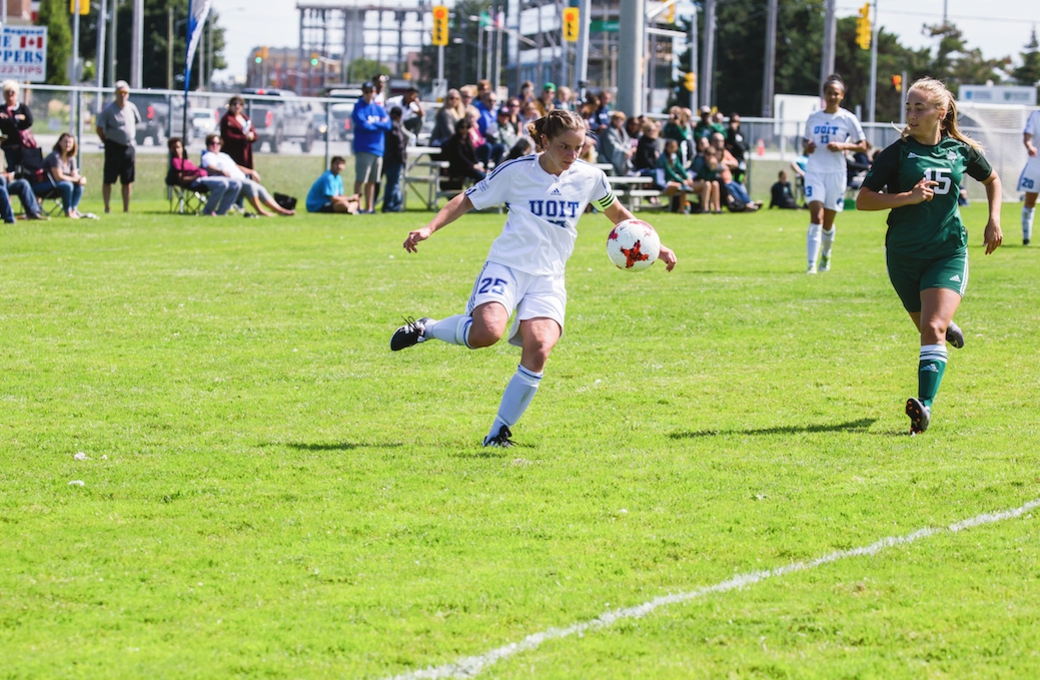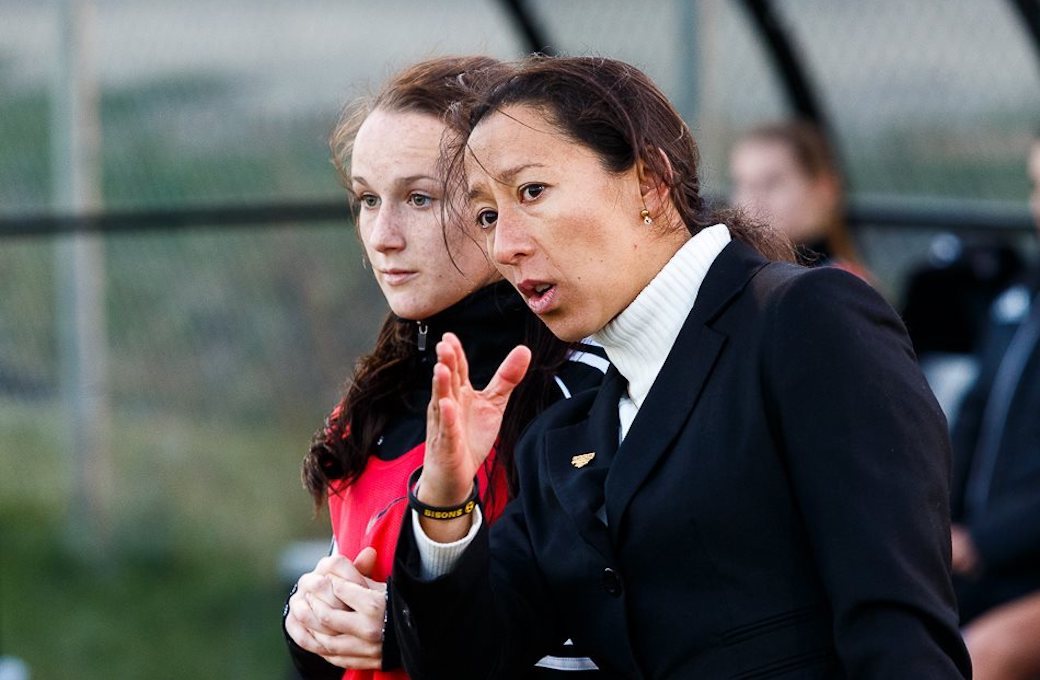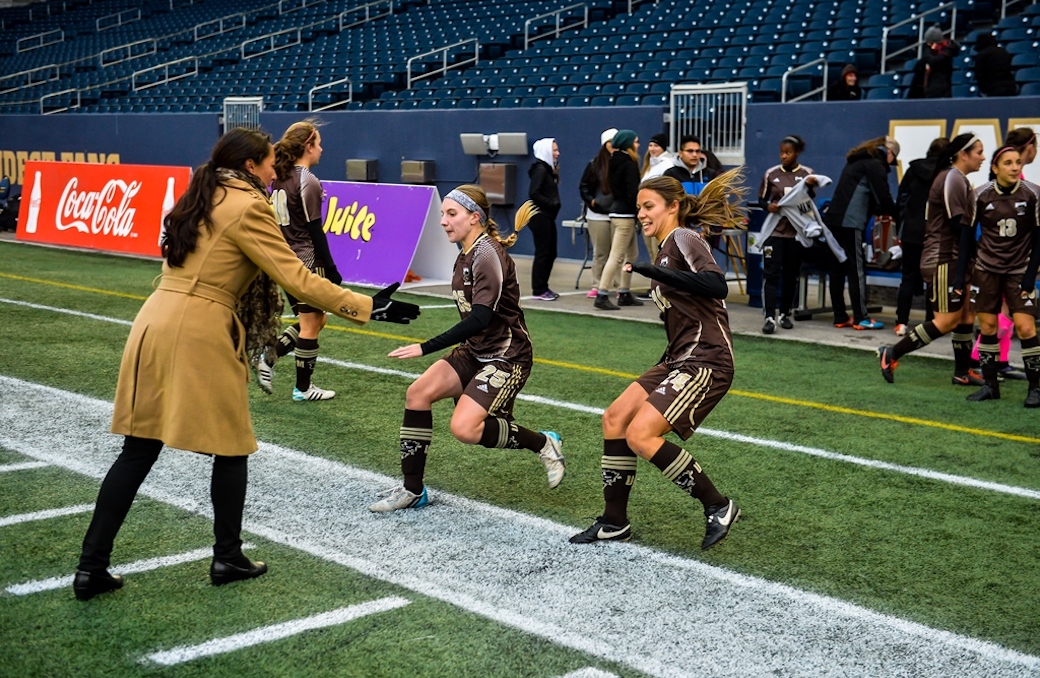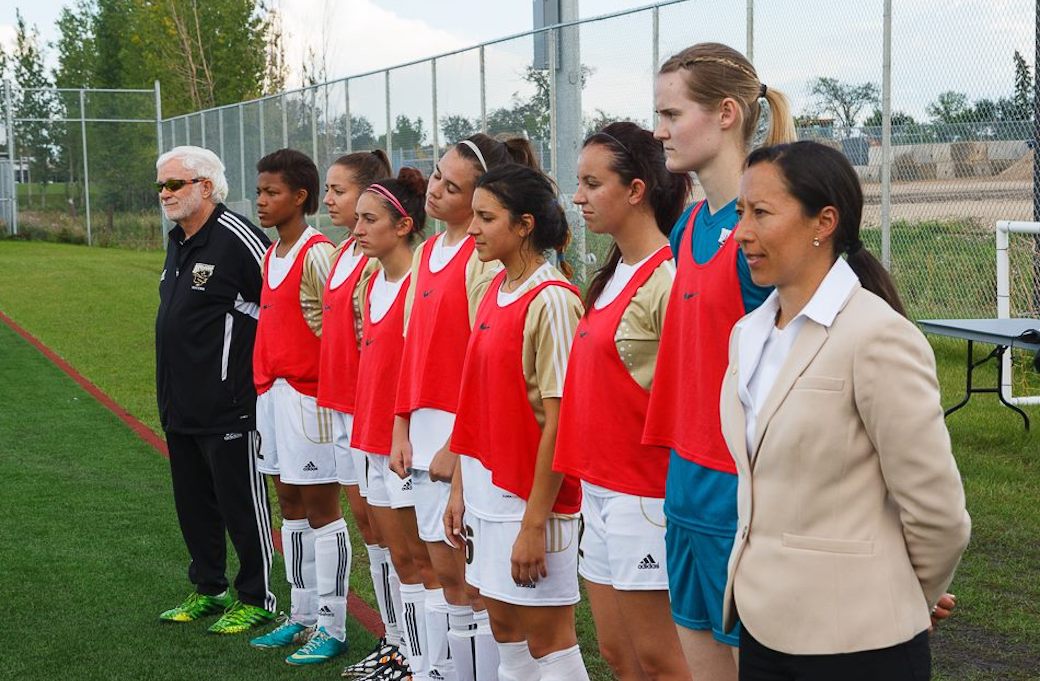Corporate
Getting to know you U SPORTS athlete: Katherine Koehler-Grassau, UOIT Ridgebacks


U SPORTS Staff

U SPORTS sits down with one key athlete, coach, and staff member of each U SPORTS athletic program in our new interview series “Getting to know…”

Name: Vanessa Martínez Lagunas
School: University of Manitoba
Sport: Women’s soccer
Position: Head coach
Seniority: Five years
Previous school/position: Assistant Coach, U16 / U17 German Women’s National Team
Hometown: Toluca, Mexico
1. How did you first get involved in coaching? What was your path to your position as head coach of the University of Manitoba Bisons Women’s Soccer Team?
I got involved in coaching for the first time at the University of Texas at Austin (UT), where I was a member of the varsity women’s soccer team. Chris Petrucelli, my former UT soccer coach, got me interested in getting into coaching. I was always curious to learn more about his coaching methods because I loved his professionalism and the attention he devoted to coaching the details. Therefore, after my first year at UT, I decided to start taking coaching courses through the U.S. Soccer Federation and the former National Soccer Coaches Association of America (now United Soccer Coaches Association) and tried to take at least one coaching course every year until I could achieve the highest available coaching levels/licenses.
Every summer, I also tried to work different soccer camps with some of the best U.S. coaches of that time (e.g. my own coach Chris Petrucelli, Anson Dorrance and Tony DiCicco) in order to learn as much as I could from them. I have always done my best to combine my university studies, playing career, and coaching activities in parallel. You can read more about my coaching path HERE.
After completing my Master’s Degree in Kinesiology / Exercise Physiology at the University of Texas at Austin, I moved to Germany to pursue a PhD in Sports Science with special focus in the physical and physiological demands of women’s soccer at the University of Leipzig. During this time, I continued training and playing at the highest possible level with teams of the first and second German Women’s Bundesliga, coached youth teams in these clubs, became an assistant coach for the German U16/U17 German Women’s National team, and continued taking coaching courses through the German Soccer Federation (DFB) until I was able to get to the UEFA Pro Soccer Coaching License (highest certification level worldwide). I became the first Latino American woman to obtain this prestigious license.
When I graduated from this course, I heard about the head coaching position at the U of M. I applied for it because it would provide me with the right environment to combine my three main passions: coaching, teaching and research and I knew I could help to grow and develop the Bison soccer program as well. We were both a great fit. I was hired in August 2013 and I am now about to start my sixth season with this wonderful institution.
2. Who are the people that have influenced you most as a coach?
There have been many people who have supported and guided in this regard. I would not be able to name them all but definitely, my former coaches Aldo Da Pozzo, Carlos Marcos and Chris Petrucelli had a very positive influence in my coaching development. Other outstanding mentors, role models, colleagues and friends I have met through my coaching path include Pia Sundhage, Anson Dorrance, Tony DiCicco, April Heinrichs, Janet Rayfield, Horst Wein, Anja Palusevic, Markus Weidner, Tina Theune, Silvia Neid, Ralf Peter, Anouschka Bernhard, Frank Wormuth, Britta Carlson, Martina Voss-Tecklenburg, Vera Pauw, Hope Powell, Sylvie Beliveau, Wade Gilbert, Leisha Strachan, Dean Kriellaars among many others. I am forever grateful to all of them for their friendship and for all their teachings and wise advice to help me develop into the coach I am today.
3. How would you describe your coaching style?
My coaching style is player-centered and is focused on guided discovery. I strive to create a positive, competitive and fun environment where my athletes can be developed/prepared to excel in soccer, academics, personal, and professional life. The three main core values that lead my coaching style are passion, continuous learning and improvement, and teamwork. Passion means a strong feeling of enjoyment and love for what you do. Continuous learning and improvement refers to the ongoing process of developing one’s skills and knowledge in order to perform effectively and adapt to the ever-changing environment. And finally, teamwork denotes a group of people working together cohesively, towards a common goal, creating a positive working atmosphere, and supporting each other to combine individual strengths to enhance team performance. Together we can achieve more! I also aspire to become a friend, mentor, inspiration, and positive role model for my athletes.

4. Which coach do you admire the most, and why?
The coach that I admired the most is Pia Sundhage, former coach of the U.S. women’s national team who led them to two Olympic gold medals in 2008 and 2012 and was named FIFA World Women’s Coach of the Year in 2012. She is one of the most positive, knowledgeable and humble coaches I have ever met. I met her for the first time at a FIFA event in 2007. I approached her that day, introduced myself and asked her what would be a piece of advice she could give to me as a young female interested in getting into coaching. She said “always stay hungry to learn more” and it’s something that I will always remember and put into practice. Once she also gave me the opportunity to observe a training camp, she led with the U.S. women’s national team in preparation for the 2012 London Olympics. I have learnt a lot from her. She has been a great role model and mentor for me.
5. What is the most “out-of-the-box” thing you’ve done as a coach?
To introduce a team cooking class during one of our pre-season camps. Our players loved it. It has now become something we do every year not only for the learning part of it, but also because it is a great team building activity and it is delicious and fun to learn new healthy recipes and then enjoy them together with the whole team. A few other Bison varsity teams have now started doing this as well.
6. What is your greatest coaching moment or achievement?
With no doubt, the greatest coaching moment or achievement so far with this institution was the opportunity to host for the first time in our program’s history the U SPORTS Women’s Soccer Championship in 2017 and coach at this level. Our team managed to achieve our first-ever win at the national level by defeating the OUA champion Guelph Gryphons 5-1, finishing the tournament in sixth place. This was also the first-ever tournament hosted at an indoor facility and the feedback from all the participating teams was excellent. Thus, history was made. Hopefully, this will open the opportunity to other potential hosts to organize the tournament indoors and make it very consistent and independent of the outside weather conditions (especially in November when there are very cold and wet conditions in most parts of the country). This also makes the tournament more attractive and enjoyable for the fans because they won’t be freezing.

7. What’s the best advice you can give to an athlete and/or athlete’s parents?
The most important piece of advice that I would give them is to always combine sports and education with excellence as well as learning new languages (at least one more than your first language). By doing this, many doors and opportunities will be open and available to you plus you will greatly enjoy the journey. I also recommend being proactive, which means being ready to look for and fight for what you want rather than waiting for it to come to you because then it will probably not happen. You must dream big and work hard and smart to make those dreams become true. There will be many ups and downs along the way, but if you truly believe in it and you persist, you will achieve it.
8. How have you changed as a coach over time? What principles/values, etc. have remained the same?
Yes, of course I have changed as a coach over time. Every year you learn new things. Your athletes help you to become a better coach each season. You must be ready and willing to learn and adapt to the ever-changing environment and the fast development/ evolution of our sport. Otherwise, you may become an obsolete coach. I am definitely now more knowledgeable and experienced than I was before. However, as I mentioned in question three, one of the main core values that lead the way I coach is continuous learning and improvement. You can always get better at something and nobody is perfect or knows everything. Or as Pia Sudhage said to me once you must “Always stay hungry to learn more”. Passion and teamwork are the other core values that will always guide the way I coach and my further development into the profession.
9. What do you enjoy doing when you’re not in coaching mode?
Playing the piano. Before I started playing soccer, I learned to play the piano and wanted to become a pianist. However, once I started playing soccer, I changed my mind and decided to dedicate myself completely to this sport first as a player and then also as a coach and sport scientist. Playing the piano really relaxes me and I enjoy it very much. Therefore, after a few years of not playing, I have started taking some piano lessons again and hope to learn more. It has now become my No.1 hobby when I am not in coaching mode.
10. What’s the most embarrassing thing that’s ever happened to you as a coach?
In one game, while I was giving some coaching instructions, I walked way too much along the sideline almost getting to the end line closer to our bench. The fourth referee had to go get me and remind me I had to stay within my coaching zone. I was so much into the game that I was truly not aware of how far I had walked and how far I was from my coaching zone. I apologized, and he just laughed at me.
Corporate
U SPORTS Staff
